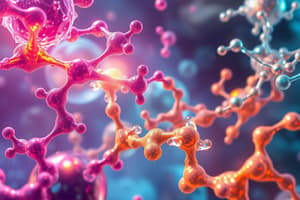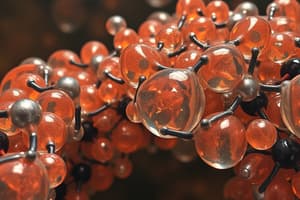Podcast
Questions and Answers
What are the three types of macromolecules found in living organisms?
What are the three types of macromolecules found in living organisms?
The three types of macromolecules found in living organisms are carbohydrates, proteins, and nucleic acids.
Why are macromolecules important in living organisms?
Why are macromolecules important in living organisms?
Macromolecules are important in living organisms because they play crucial roles in cell structure, energy storage, and genetic information.
Give an example of each type of macromolecule and its function.
Give an example of each type of macromolecule and its function.
An example of a carbohydrate is glucose, which provides energy. An example of a protein is hemoglobin, which carries oxygen in the blood. An example of a nucleic acid is DNA, which carries genetic information.
Why are lipids considered water insoluble?
Why are lipids considered water insoluble?
What are lipids and how do they differ from macromolecules?
What are lipids and how do they differ from macromolecules?
What is the molecular weight of lipids compared to macromolecules?
What is the molecular weight of lipids compared to macromolecules?
Flashcards are hidden until you start studying




